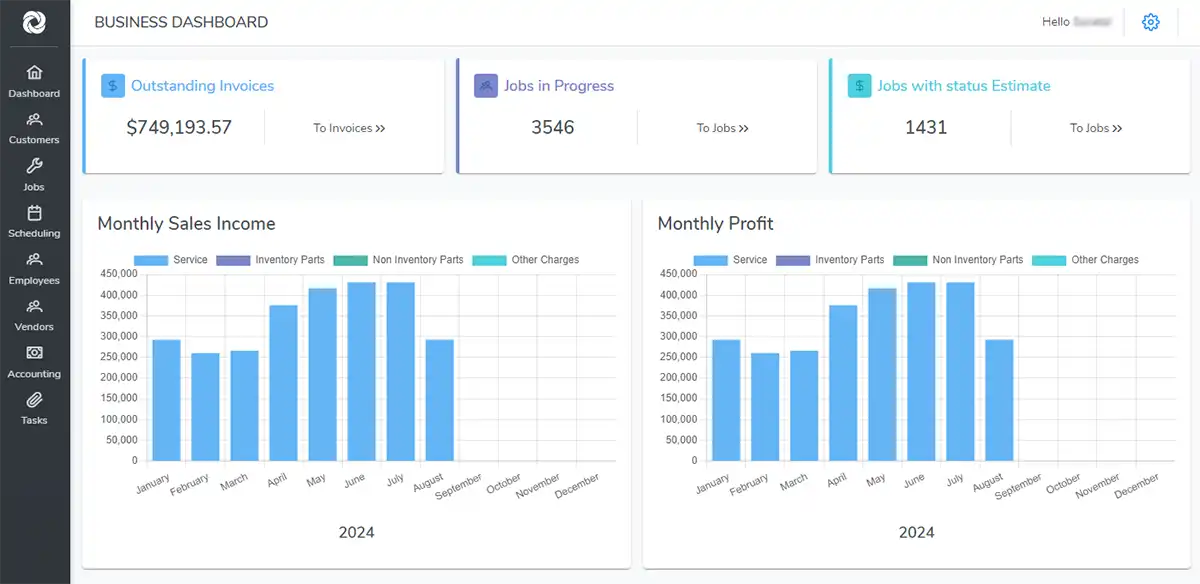
In today's market, service contractors face numerous challenges, from scheduling jobs efficiently to managing invoices and ensuring customer satisfaction. Business management software tailored for service contractors is essential to streamline operations, enhance productivity, and improve profitability. This guide explores the key features, benefits, and factors to consider when choosing the best software for your contracting business.
What is Business Management Software for Service Contractors?
Business management software is a digital solution designed to help service contractors manage daily operations, including scheduling, invoicing, customer relationship management (CRM), inventory tracking, reporting, and workforce management. This field service software for small business integrates multiple business functions into a single platform, reducing manual work and increasing efficiency.
Key Features of Business Management Software
1. Scheduling and Dispatching
Efficient job scheduling is crucial for service contractors. The right software should provide real-time scheduling, GPS tracking for technicians, automated notifications for customers, and drag-and-drop calendar features for seamless dispatching.
2. Customer Relationship Management (CRM)
A built-in CRM helps track customer interactions, manage service history, and streamline communication to improve customer retention and satisfaction. It should also include automated follow-ups, appointment reminders, and marketing tools to nurture client relationships.
3. Estimates and Invoicing
Generating accurate estimates and invoices quickly ensures timely payments. Automated invoicing features reduce errors and improve cash flow management. Integrated payment processing solutions can further streamline the billing process, allowing contractors to accept payments online, via mobile, or in person.
4. Inventory and Equipment Management
Keeping track of tools, materials, and equipment ensures contractors always have the necessary resources for jobs, minimizing downtime and unexpected costs. The software should provide automated stock alerts, supplier tracking, and job cost estimation to improve procurement planning.
5. Mobile Accessibility
With cloud-based solutions, service contractors can access business data, update job statuses, and communicate with teams in real-time from any device. Field technicians should be able to upload photos, collect digital signatures, and update work orders on the go.

6. Automated Reporting and Analytics
Advanced reporting tools help businesses track revenue, expenses, employee productivity, and customer satisfaction, enabling data-driven decision-making. Customizable dashboards with KPI tracking provide a real-time overview of business performance.
7. Work Order Management
A comprehensive work order management feature ensures that contractors can create, assign, and track job progress efficiently. Automation allows for assigning jobs based on availability, skill set, and geographic location.
8. Time Tracking and Payroll Integration
Time tracking ensures accurate labor cost estimation and payroll calculations. Integration with payroll systems allows for seamless employee wage processing, reducing administrative burdens.
Benefits of Business Management Software for Contractors
1. Increased Efficiency and Productivity
Automating administrative tasks reduces manual work, allowing contractors to focus on service delivery and business growth.
2. Enhanced Customer Satisfaction
Quick response times, accurate scheduling, and seamless communication lead to better customer experiences, positive reviews, and repeat business. Automated reminders and self-service customer portals enhance convenience.

3. Reduced Operational Costs
By optimizing scheduling, inventory, and financial management, service contractors can minimize unnecessary expenses and maximize profits. Reducing paperwork and eliminating redundancies leads to cost savings.
4. Compliance and Documentation
Managing contracts, permits, and regulatory compliance becomes easier with a centralized system that stores and tracks important documents. Digital signatures and secure cloud storage ensure compliance with industry regulations.
5. Scalability
As businesses grow, software solutions can scale to accommodate additional employees, customers, and services. Cloud-based platforms allow for easy expansion without requiring costly hardware upgrades.
6. Competitive Advantage
Companies leveraging business management software can outperform competitors by delivering services faster, improving customer engagement, and managing resources more effectively. Automating workflows enables contractors to take on more jobs without sacrificing quality.
How to Choose the Right Business Management Software
1. Identify Business Needs
Assess your current operational challenges and determine which software features will provide the most value to your business.
2. Evaluate Ease of Use
A user-friendly interface ensures quick adoption by your team, reducing training time and increasing productivity. Look for intuitive navigation and robust training support.
3. Integration Capabilities
Ensure the software integrates with existing tools such as accounting software, payment gateways, customer portals, and project management systems to streamline workflow.
4. Customization and Scalability
Look for software that can be customized to fit your specific business needs and grow with your company. Configurable workflows, branded invoices, and tailored reporting options are essential.
5. Customer Support and Training
Reliable customer support and training resources ensure smooth implementation and ongoing assistance. 24/7 support, onboarding assistance, and comprehensive knowledge bases add significant value.
Conclusion
Investing in business management software is a game-changer for service contractors looking to streamline operations, enhance customer satisfaction, and increase profitability. With automation, mobile access, and data-driven insights, service businesses can operate more efficiently and drive growth. By selecting the right software with essential features, contractors can improve efficiency and expand their businesses while maintaining high-quality service delivery.
